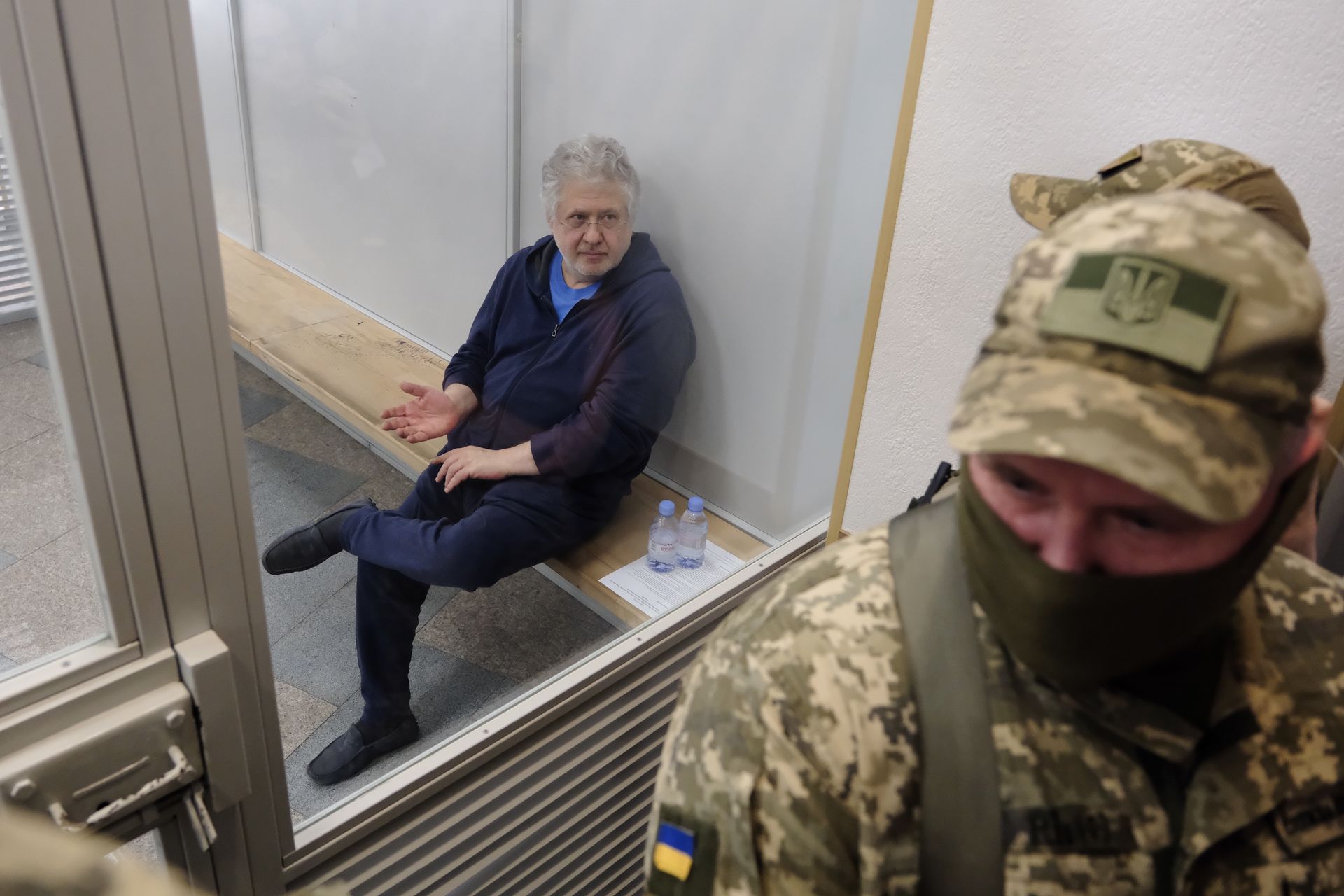As Ukraine reparation loan talks drag on, EU provides billions to cover Kyiv's financial needs

European Commission President Ursula von der Leyen (R) shakes hands with President Volodymyr Zelensky (L) before a meeting at the European Commission in Brussels, Belgium, on Aug. 17, 2025. (Simon Wohlfahrt / AFP via Getty Images)
BRUSSELS, Belgium - The European Commission on Wednesday delivered another tranche of short-term financial relief to Kyiv as talks over a much larger reparations loan based on frozen Russian assets remain mired in political deadlock.
The European Commission on Nov. 13 announced that Ukraine received 5.9 billion euros from existing European initiatives. Similarly, the European Investment Bank on the same day announced over 200 million euros in new grants to support critical infrastructure, including gas, water and housing.
Those smaller commitments come as Kyiv races to plug a $61 billion gap in its financing over 2026–2027, which it hopes would be filled by a 140 billion euro 'reparations loan' backed by frozen Russian central bank assets.
Belgian Prime Minister Bart De Wever, whose country hosts the vast majority of frozen funds, refused to back an agreement in October for fear of potentially being left alone to repay Russia the equivalent of a third of Belgium's GDP.

The spate of modest financing commitments and payouts does little to allay the precarious situation in Ukraine, as the country approaches a looming cliff-edge in financing forecast for 2026, grapples with a major corruption scandal, and faces devastating Russian air strikes on its energy infrastructure.
Waiting for loan options
The European Commission was expected to produce a long-awaited options paper this month that would spell out alternatives to the assets to finance Ukraine’s needs for the next two years, though, according to EU diplomats, national capitals have not received any document to date.
European Commission President Ursula von der Leyen outlined alternatives to a reparations loan to fund Ukraine's budget and military based on the frozen assets, which, according to the EU executive, could include raising debt on the markets backed by the EU budget or bilateral national agreements for individual borrowing.
EU finance ministers received an oral presentation on Thursday.
“There was wide recognition that this option (reparations loan backed by Russian frozen assets) is the most feasible means of quickly bridging Ukraine's funding gap without placing additional fiscal burden on member states,” Economy Commissioner Valdis Dombrovskis told reporters in Brussels on 12 Nov., adding the paper would be “shortly” sent to national capitals.
Von der Leyen, however, said the loan itself remains the leading option, as the other alternatives would require fiscal adjustments to national budgets that are unlikely to be popular. Nordic countries, traditionally more fiscally conservative, have meanwhile already ruled out joint borrowing.
Several EU diplomats told the Kyiv Independent that they expect the backing by assets to remain the only politically feasible way towards the December EU summit. They also believe it will come in the end come down to working out operational technicalities with Belgium, who has played hardball over the past few months.

A crisis meeting last Friday between Belgian and European Commission officials, which tried to reassure the Belgian leadership that any financial and legal risks associated with the loan would be taken care of, did not result in breaking the deadlock.
EU officials have floated bringing sovereign assets located in other jurisdictions besides Belgium, such as France and Luxembourg, into the mix as well, but the strategy could meet face the obstacle of some of those funds being mostly kept in private banks.
Belgium, however, is not the only country that has voiced to exercise caution, EU diplomats say.
“(The Belgian government) is naturally very vocal about its quite legitimate concerns, but as with other politically sensitive issues, some other member states are conveniently hiding behind them,” one EU diplomat said on condition of anonymity.
Slovak Prime Minister Robert Fico on Saturday said his country would not agree to the use of frozen Russian sovereign assets to allow Ukraine to purchase weapons.
Narrow timeframe for Ukraine needs
Ukraine has, meanwhile, warned it would need fresh financial assistance in the second quarter of 2026 at the latest, which narrows the possible timeframe for a deal on the EU side.
Ukraine is resorting to a patchwork of measures to stretch its finances in 2026, including using unspent funds of government ministries in 2025, domestic borrowing, and potentially frontloading ERA loans scheduled to be disbursed from the World Bank throughout 2026.
Ukraine’s President Volodymyr Zelenskyy told Bloomberg Television in an interview that he hopes European allies will overcome their divisions on the use of frozen Russian assets as their country’s survival would rest on them.
"Corruption is a problem in Ukraine, but they are taking measures to combat this — I do not see this case as any problem for advancing the reparation loan."
“I hope, God bless, we will get this decision, (…) (otherwise) we will have to find an alternative, it’s a question of our surviving. That’s why we need it very much. And I count on partners,” Zelenskyy said.
However, some EU diplomats are now also concerned that the latest corruption scandal in Kyiv could be a wind in the wings for countries like Hungary or Slovakia to further stall financial support efforts.
Ukraine is being rocked by the biggest corruption scandal of Zelensky's presidency, as his former business partner Timur Mindich is accused by the country's anti-graft agencies of being the ringleader in a $100 million money laundering scheme.
Zelensky on Nov. 13 imposed sanctions on Mindich, who fled the country before he could be charged.
"Corruption is a problem in Ukraine, but they are taking measures to combat this — I do not see this case as any problem for advancing the reparation loan," Finland’s Finance Minister Riikka Purra told reporters in Brussels.











